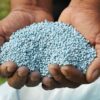How Fertilizers Help Farmers: Boosting Yields and Sustaining Agriculture
Fertilizers play a vital role in modern agriculture by enhancing crop growth and improving soil fertility. For farmers, they are one of the most important tools for increasing productivity, ensuring food security, and making the most of every acre of land.
1. Replenishing Soil Nutrients
Over time, continuous farming depletes essential nutrients from the soil, such as nitrogen (N), phosphorus (P), and potassium (K). Fertilizers help replenish these nutrients, ensuring that the soil remains fertile and productive. Without them, the soil would lose its ability to support healthy plant growth.
2. Increasing Crop Yields
One of the main reasons farmers use fertilizers is to increase their harvests. By providing crops with the nutrients they need, fertilizers support faster growth, better flowering, and stronger root systems. This results in higher yields per hectare, which directly benefits the farmer’s income and food supply.
3. Improving Crop Quality
Fertilizers don’t just increase the quantity of crops—they can also improve quality. Well-nourished plants produce larger, healthier, and more nutritious fruits, vegetables, and grains. This is especially important for farmers who supply to markets that demand high-quality produce.
4. Enhancing Soil Health (with the Right Use)
When used properly and in combination with organic matter, fertilizers can improve soil structure and support long-term fertility. For example, some fertilizers contain secondary nutrients and micronutrients that boost microbial activity in the soil, helping it retain moisture and resist erosion.
5. Supporting Sustainable Farming
With the world’s population growing, farmers need to produce more food using the same or less land. Fertilizers make this possible by increasing output efficiently. When managed responsibly, fertilizers help farmers achieve food security while minimizing pressure on forests and natural ecosystems.
6. Saving Time and Labor
Fertilizers offer a quick and effective way to provide crops with necessary nutrients, reducing the need for labor-intensive practices like composting or crop rotation alone. This is especially beneficial for smallholder farmers who need efficient solutions.



